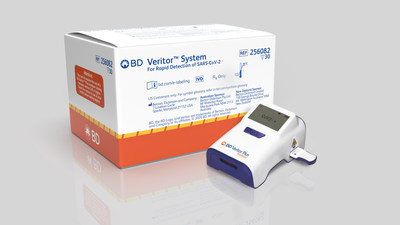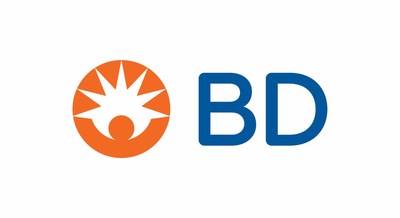New Head-to-Head Study Demonstrates Equivalency and Accuracy of COVID-19 Rapid Point-of-Care Tests, Despite Different Test Sensitivity Claims
BD (Becton, Dickinson and Company) announced a study showing the BD Veritor™ System for Rapid Detection of SARS-CoV-2 is as effective as the Quidel Sofia 2 SARS Antigen Fluorescent Immunoassay. The research involved 361 patient samples, indicating a high agreement in testing accuracy. The BD Veritor™ Plus system showed better correlation with PCR results than its competitor. The study aims to assess performance in community settings and highlights the importance of various factors in understanding antigen assay performance. The findings support the rapid antigen tests' utility in managing COVID-19.
- Study shows BD Veritor™ Plus system has high agreement with PCR testing.
- Rapid results in about 15 minutes make it a valuable tool in decentralized healthcare settings.
- The research involved a broad clinical trial across 21 diverse U.S. regions.
- Published sensitivity claims for BD Veritor™ (84%) are lower than Quidel Sofia (96.7%) and not supported by the study.
Insights
Analyzing...
FRANKLIN LAKES, N.J., Sept. 9, 2020 /PRNewswire/ -- BD (Becton, Dickinson and Company) (NYSE: BDX), a leading global medical technology company, today announced the results of a new research study that demonstrated performance of the BD Veritor™ System for Rapid Detection of SARS-CoV-2 Assay was equivalent to that of the Quidel Sofia 2 SARS Antigen Fluorescent Immunoassay (AFI).
In the blinded, head-to-head study, 361 patient samples representing a cross-sectional population were tested for the detection of SARS-CoV-2 using both the BD Veritor™ Plus system and the Quidel Sofia 2 SARS AFI. The two testing platforms had a high degree of agreement on testing results. When there was disagreement between the tests (i.e. one showed positive, one showed negative), the samples were then tested using molecular PCR (polymerase chain reaction), which has higher sensitivity than antigen tests. The PCR analysis of the discrepancies favored the BD Veritor™ Plus system, which had more agreement with PCR analysis than the Quidel Sofia 2 SARS AFI. Of the seven discrepancies, PCR analysis agreed with the BD Veritor™ Plus system on five results and agreed with the Sofia 2 SARS AFI on two results. Overall, the study suggests a high degree of agreement in testing accuracy between the two systems.
"The difference in published sensitivity claims for the Quidel Sofia SARS AFI (
Dr. Stephanie N. Taylor, M.D., Professor of Medicine, Section of Infectious Diseases at Louisiana State University and a study co-author said, "This study shows that EUA labeled sensitivity and specificity should not be the sole basis for understanding antigen assay performance. Other factors, such as clinical trial enrollment criteria, study population characteristics, clinical setting, reference method sensitivity, overall prevalence in the trial population and the limit of detection for each antigen test are all important considerations in order to arrive at a fuller understanding of overall performance."
In addition to showing a high degree of agreement between the two tests, the study also supports that the combination of reliable accuracy and speed to result (about 15 minutes) of rapid antigen tests are valuable tools to combat the COVID-19 pandemic, particularly in decentralized health care settings where larger-scale, molecular-based tests are not practical or would result in significantly longer turnaround times.
As part of its emergency use authorization (EUA) for the SARS-CoV-2 assay for the BD Veritor™ Plus system, BD completed one of the geographically broadest U.S. clinical trials of any antigen test on the market today, collecting and analyzing 226 samples from 21 diverse areas across the United States. This effort was intended to reflect performance across a range of different community-based clinical settings by enrolling patients reflective of those typically seeking rapid point-of-care diagnostic testing. The BD Veritor™ Plus system was studied in care settings and patient populations most likely to rely on rapid point-of-care tests, including ambulatory care sites, outpatient clinics, drive-through and walk-up testing sites, and skilled nursing facilities.
The research study authors have submitted the paper for peer-review consideration to an infectious disease journal. The preprint article titled "Clinical evaluation of BD Veritor™ SARS-CoV-2 point-of-care test performance compared to PCR-based testing and versus the Sofia SARS Antigen point-of-care test" is currently available on medRxiv.
1. Positive percent agreements shown in the EUA instructions for use are estimates of sensitivity.
About the BD Veritor™ System for Rapid Detection of SARS-CoV-2 Assay
The BD Veritor™ Plus System for Rapid Detection of SARS-CoV-2 Assay has not been cleared or approved by FDA. The test has been authorized by FDA under an EUA for use by authorized laboratories. The test has been authorized only for the detection of proteins from SARS-CoV-2, not for any other viruses or pathogens; and, the test is only authorized for the duration of the declaration that circumstances exist justifying the authorization of emergency use of in vitro diagnostics for detection and/or diagnosis of COVID-19 under Section 564(b)(1) of the Act, 21 U.S.C. § 360bbb-3(b)(1), unless the authorization is terminated or revoked sooner.
About BD
BD is one of the largest global medical technology companies in the world and is advancing the world of health by improving medical discovery, diagnostics and the delivery of care. The company supports the heroes on the frontlines of health care by developing innovative technology, services and solutions that help advance both clinical therapy for patients and clinical process for health care providers. BD and its 65,000 employees have a passion and commitment to help enhance the safety and efficiency of clinicians' care delivery process, enable laboratory scientists to accurately detect disease and advance researchers' capabilities to develop the next generation of diagnostics and therapeutics. BD has a presence in virtually every country and partners with organizations around the world to address some of the most challenging global health issues. By working in close collaboration with customers, BD can help enhance outcomes, lower costs, increase efficiencies, improve safety and expand access to health care. For more information on BD, please visit bd.com.
Contacts: | |
Troy Kirkpatrick | Kristen Stewart |
![]() View original content to download multimedia:http://www.prnewswire.com/news-releases/new-head-to-head-study-demonstrates-equivalency-and-accuracy-of-covid-19-rapid-point-of-care-tests-despite-different-test-sensitivity-claims-301126072.html
View original content to download multimedia:http://www.prnewswire.com/news-releases/new-head-to-head-study-demonstrates-equivalency-and-accuracy-of-covid-19-rapid-point-of-care-tests-despite-different-test-sensitivity-claims-301126072.html
SOURCE BD (Becton, Dickinson and Company)









